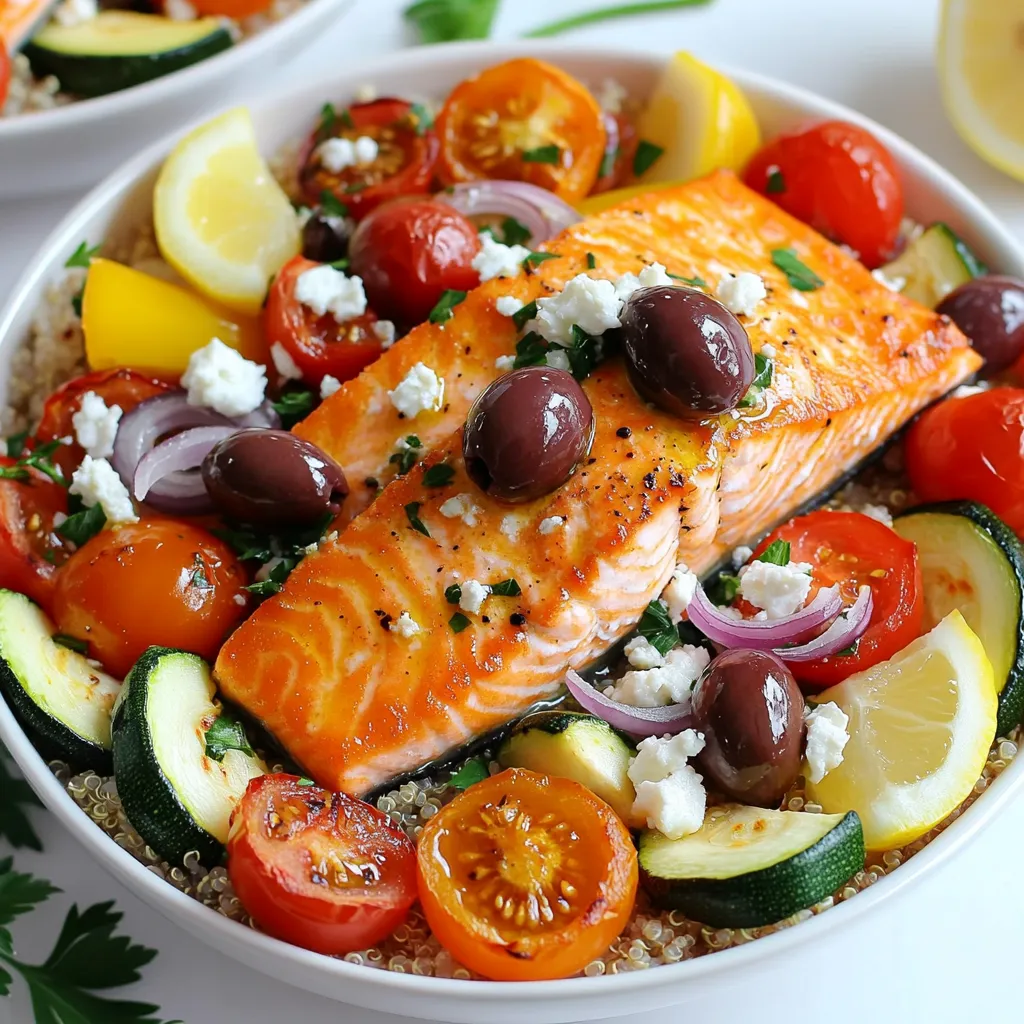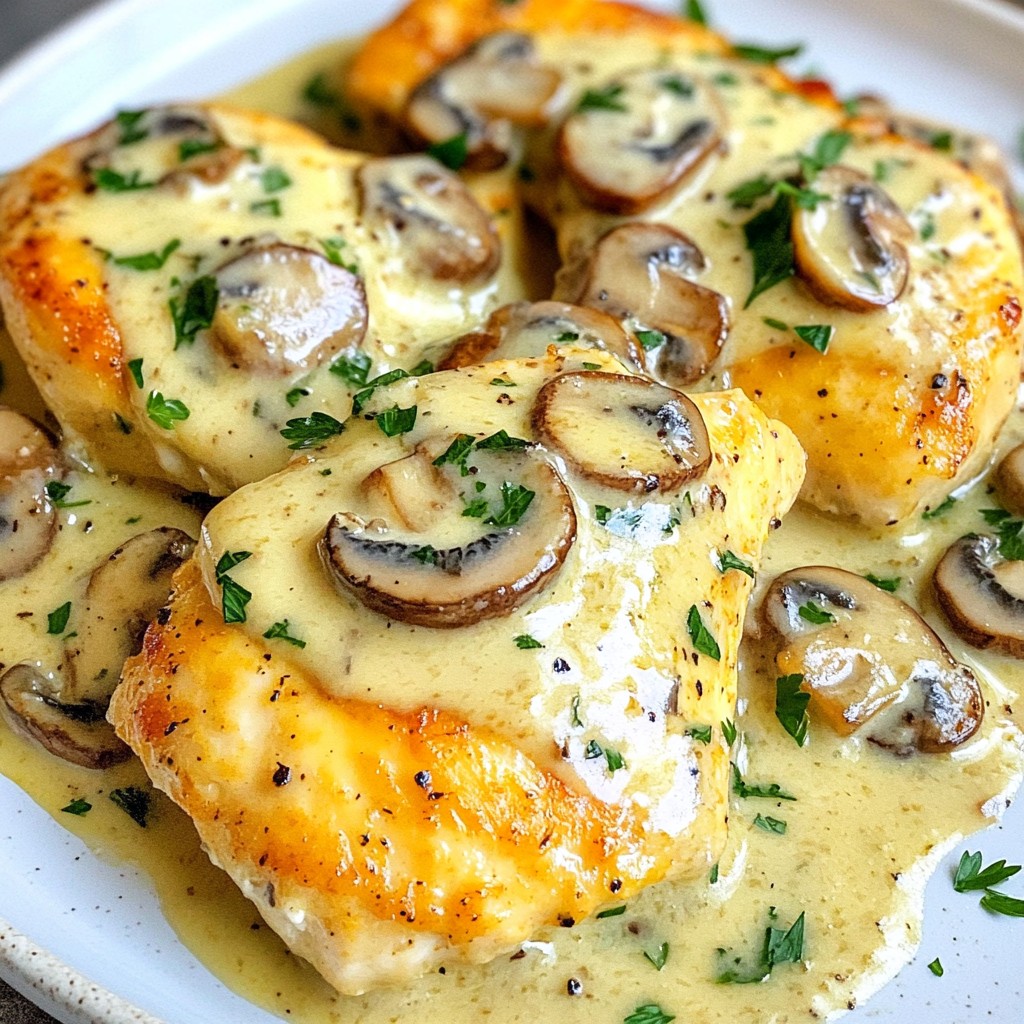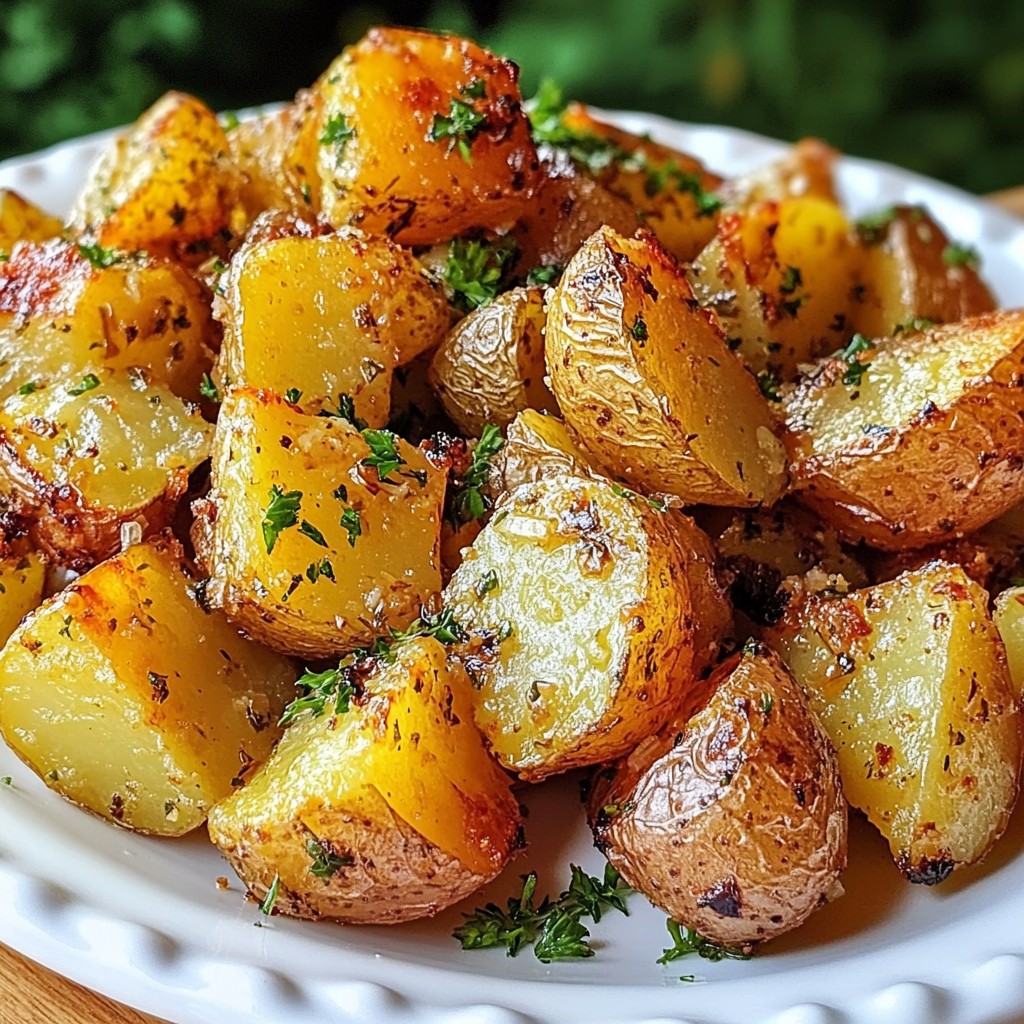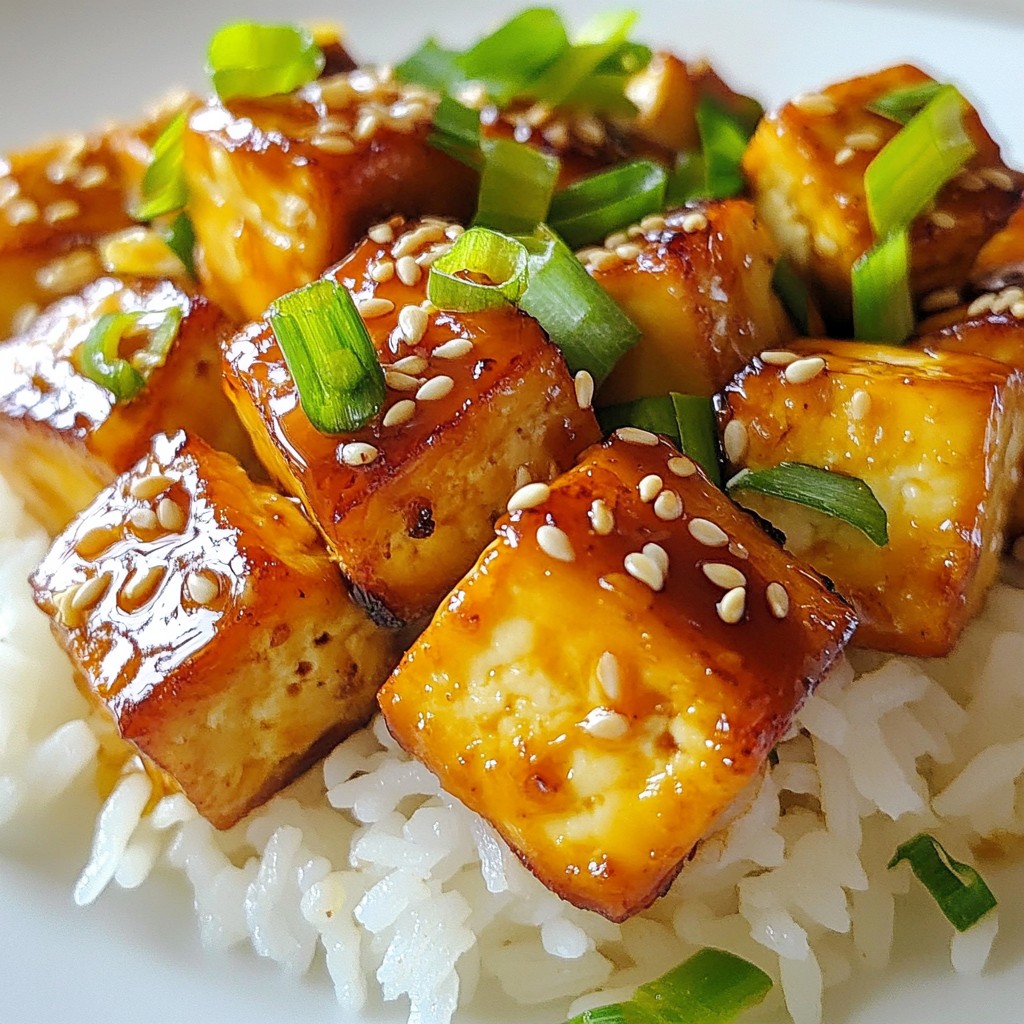Looking for a quick, healthy meal? Let me introduce you to Sheet Pan Mediterranean Salmon Bowls! This easy recipe pairs flaky salmon with fresh veggies and quinoa. You’ll be amazed at how simple it is to prepare a tasty dish in one pan. Plus, it’s full of flavor and customizable for your taste. Ready to impress your family with a meal that’s both hearty and healthy? Let’s dive in!
Ingredients
Main Ingredients
– 4 salmon fillets (around 6 oz each)
– 1 cup cherry tomatoes, halved
– 1 zucchini, sliced into half-moons
– 1 bell pepper (red or yellow), sliced
– 1 red onion, sliced into wedges
– 1 cup cooked quinoa
The main stars here are the salmon and fresh vegetables. Salmon brings healthy fats and protein. The colorful veggies add crunch and nutrients. Quinoa acts as a great base, full of fiber and protein.
Seasoning and Garnish
– 2 tablespoons olive oil
– 2 teaspoons dried oregano
– 1 teaspoon garlic powder
– Salt and pepper to taste
– 1/4 cup Kalamata olives, pitted and halved
– 1/4 cup feta cheese, crumbled
– 1 lemon, cut into wedges (for serving)
– Fresh parsley, chopped (for garnish)
Seasoning is key to flavor. Olive oil adds richness. Dried oregano and garlic powder bring a nice Mediterranean touch. Feta cheese and olives add a salty kick. Lemon wedges brighten up the dish.
Optional Instructions
– For extra flavor, try adding capers or artichokes.
– If you don’t have quinoa, use rice or couscous.
– Swap salmon with chicken or tofu for variety.
These suggestions can help you customize your meal. Feel free to get creative with what you have!
Step-by-Step Instructions
Prepping the Oven and Sheet Pan
First, you need to preheat your oven to 400°F (200°C). This temperature helps cook everything evenly. While the oven heats, line a large baking sheet with parchment paper. This makes clean-up easy and prevents sticking.
Preparing the Vegetables
Next, grab a mixing bowl. Combine 1 cup of halved cherry tomatoes, 1 sliced zucchini, 1 sliced bell pepper, and 1 sliced red onion. Drizzle with 1 tablespoon of olive oil. Sprinkle in salt, pepper, and 1 teaspoon of dried oregano. Toss everything together so the veggies get well coated.
Now, spread the seasoned vegetables on one side of the baking sheet. Make sure they are in a single layer. This helps them roast nicely.
Seasoning and Placing the Salmon
In the same bowl, place 4 salmon fillets. Drizzle with 1 tablespoon of olive oil. Then, add 1 teaspoon of garlic powder, the remaining oregano, and season with salt and pepper. Mix gently to coat the salmon.
Now, place the salmon fillets skin-side down on the other side of the baking sheet. This layout allows the salmon and veggies to roast together.
Cooking Time
Roast everything in your preheated oven for 15-20 minutes. The salmon is done when it flakes easily with a fork. The veggies should be tender and slightly charred. Keep an eye on them to avoid overcooking.
Preparing the Quinoa
While the salmon and vegetables roast, prepare your quinoa according to the package instructions. This usually takes about 15 minutes. Timing it with the roasting process makes sure everything is ready at the same time.
Assembling the Bowls
Once everything is cooked, it’s time to assemble your bowls. Start by adding a scoop of quinoa at the bottom of each bowl. Then, place a salmon fillet on top, followed by the roasted vegetables. Add 1/4 cup of Kalamata olives and some crumbled feta cheese to each bowl.
For the final touch, garnish with fresh chopped parsley and serve with lemon wedges on the side. Enjoy your tasty creation!
Tips & Tricks
Success Tips for Perfect Salmon
To avoid overcooking salmon, use a timer. Salmon cooks fast! Check it after 15 minutes. It is done when it flakes easily with a fork. If you overcook it, it can become dry.
For crispy vegetables, spread them out on the pan. Don’t crowd them! This lets hot air circulate. Use a high oven temperature of 400°F. This helps them char and become tender.
Flavor Enhancements
You can add extra herbs and spices to boost flavor. Consider fresh dill or basil for a fresh taste. Lemon zest also brightens the dish. Try different combinations to find what you like best.
Customizing with sauces or dressings is easy. A drizzle of tahini or a squeeze of lemon adds zest. You can also try a yogurt-based sauce for creaminess. These small changes can really elevate your meal.
Serving Suggestions
Pair your salmon bowls with a simple side salad. A light Greek salad works well. You can also serve a glass of white wine or sparkling water. These drinks complement the salmon nicely.
For presentation, use large, shallow bowls. Start with quinoa, then layer salmon and veggies on top. Sprinkle with feta and olives for color. A lemon wedge on the side adds a nice touch. Garnish with fresh parsley for a pop of green.
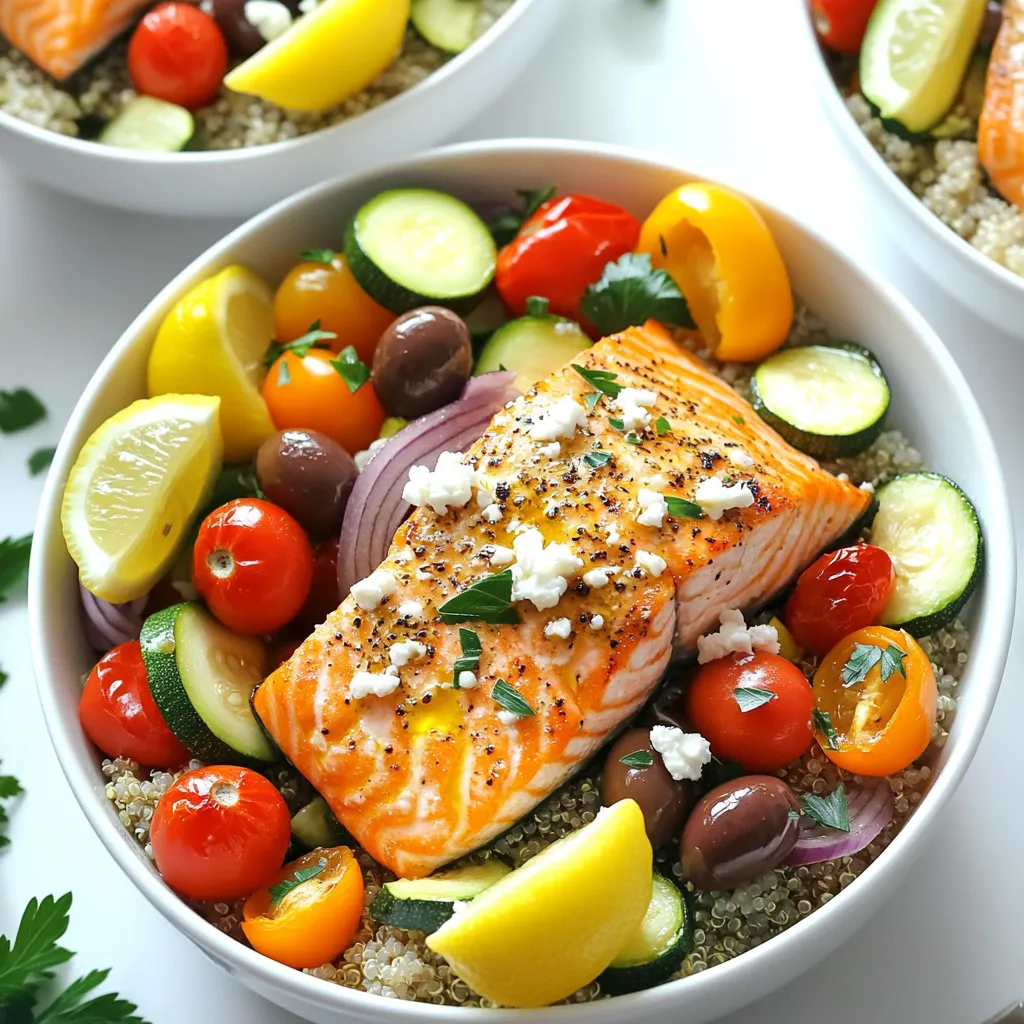
Variations
Different Protein Options
You can switch up the protein in your Mediterranean salmon bowls. Here are a few ideas:
– Alternative fish choices: Try using trout or cod instead of salmon. They cook similarly. Both have a mild taste and pair well with Mediterranean flavors.
– Vegetarian alternatives: If you want a plant-based option, use marinated tofu or chickpeas. Both add protein and work well with the other ingredients.
Seasonal Vegetable Swaps
Changing the vegetables keeps your meal fresh and tasty. Here’s how to make it seasonal:
– Best vegetables for different seasons: In spring, use asparagus and snap peas. Summer brings zucchini and bell peppers. In fall, try Brussels sprouts and butternut squash. Winter is great for root veggies like carrots and parsnips.
– Using frozen or fresh vegetables: Frozen veggies are quick and easy. They cook well and save time. Fresh veggies add great flavor. Choose based on what you have.
Flavor Profile Adjustments
You can change the flavors to suit your taste. Here are some fun ideas:
– Mediterranean-inspired twists: Add spices like cumin or paprika for a different kick. You could also try a sprinkle of sumac for a unique tang.
– Incorporating different cheeses or olives: Swap feta for goat cheese or use mozzarella for a creamier texture. For olives, consider green olives or even capers for a salty bite.
Storage Info
Refrigeration Guidelines
To store leftovers, place your salmon bowl in an airtight container. Keep it in the fridge for up to three days. Always let the food cool before sealing. This helps prevent moisture buildup.
I recommend using glass containers. They are safe, easy to clean, and do not absorb odors. They also let you see the food inside!
Freezing Instructions
If you want to freeze the bowls, assemble them without the feta and lemon. Wrap each bowl tightly in plastic wrap, then in aluminum foil. This keeps them fresh. You can freeze them for up to three months.
To thaw, move the bowl to the fridge overnight. For reheating, use the microwave or oven. If you use the oven, cover the bowl with foil. Heat it at 350°F until warm.
Shelf Life Considerations
Eat your salmon bowls within three days if refrigerated. If frozen, try to eat them within three months for the best taste.
Look for any off smells or changes in color. If the food smells sour or looks slimy, it’s best to toss it. Always trust your senses!
FAQs
Can I use other types of fish for this recipe?
Yes, you can use other fish. Good options include trout, tilapia, or cod. Each fish has a different cooking time. For trout, cook for 15-18 minutes. For tilapia, aim for 12-15 minutes. Cod usually takes about 15-20 minutes. Always check for flakiness!
How do I know when the salmon is cooked properly?
The salmon is done when it reaches an internal temperature of 145°F (63°C). It should flake easily with a fork. If the fish is still translucent in the center, give it a few more minutes. The texture should be moist but not mushy.
Can I make this recipe in advance?
Yes, you can prepare this dish ahead of time. Cook the salmon and veggies, then store them in airtight containers. Keep the quinoa separate. When ready to eat, reheat the salmon and veggies in the oven or microwave. This makes it great for meal prep!
What can I use instead of quinoa?
If you want a substitute, try brown rice, couscous, or farro. Each gives a different texture. For a low-carb option, you can also use cauliflower rice. Adjust cooking times based on the substitute you choose.
Is this recipe gluten-free?
Yes, this recipe is gluten-free. All the ingredients are safe for a gluten-free diet. Just double-check the labels on the quinoa and feta cheese to ensure they are certified gluten-free. Enjoy without worry!
This blog post covered how to make a tasty salmon bowl. We explored key ingredients like salmon, fresh veggies, and quinoa. I shared step-by-step instructions for roasting and assembling your meal. We also discussed tips to enhance flavors and variations for different diets.
As you try this recipe, remember to enjoy the process. Customize it to your taste and have fun! Your kitchen is a place for creativity and delicious meals.
